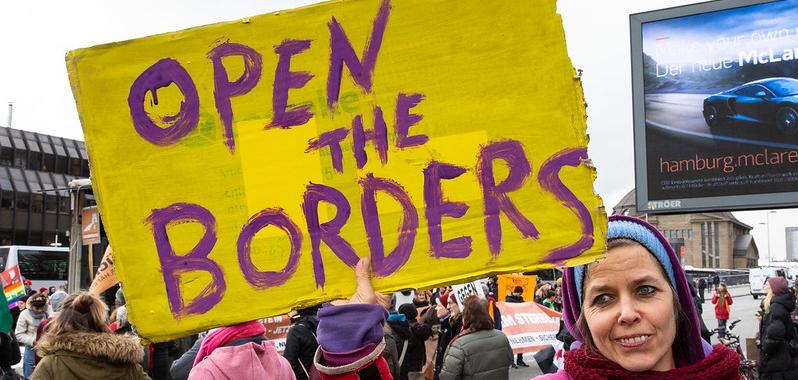“Open borders” has become an epithet that Republican use to attack Democrats, blaming many problems in the United States on the lack of attention to the border. However, rather than countering with a more humane policy on the border, the Biden Administration maintained and even expanded many of the Trump Administration’s strict immigration policies, including a June 2024 executive order that effectively banned asylum claims. Vice President Kamala Harris’s first campaign ads in her run for the presidency pledged to hire more Border Patrol agents in an effort to close the border.
In his new book The Case for Open Borders, John Washington asks what it would look like if the world went in the opposite direction and embraced the idea of open borders. Washington envisions a future where all borders are open to free movement without reliance on identity documents or citizen affiliation while others are free to remain in place. Reece Jones spoke with Washington recently about why the right-wing claim of “open borders” remains such a powerful fear-mongering tactic and why borders cause us to forget our shared humanity. Washington argues that the call for open borders is not an idealist fantasy but a realistic and needed policy proposal for the current moment.

Reece Jones: In The Case for Open Borders, you demonstrate the many arguments in favor of open borders through economic, moral, ethical, and historical terms. And yet, the world is moving towards ever more violent and closed borders. Why is the right-wing argument so much more effective?
Washington: The Right and the Left are correct that there are very serious problems in the world: there are gross and growing levels of inequality, cascading effects of climate change, a reversion to military aggression, territorial conquest, and irredentism. But neither side is actually approaching the problems in the right way. The Right is harnessing these very real issues, or at least the fear of these very real issues, and they’re doing so in a strategic way. The Right is responding through the lens of bordering. They think that locking down the border is a solution to these problems when actually it exacerbates them. They are leaning very hard into fear, which readily translates to slogans or bumper stickers. The Right’s position is effective, [because] we’ve seen it be a winning campaign strategy. Trump came into office by harnessing this fear.
The Left, meanwhile, hasn’t been able to really defeat the Right’s stance. They have even been trying to do a sort of a lighter version, or slightly more humane version. But they have not been addressing the underlying issues, which is why the Right has been successful. The Right has co-opted the narrative and stoked fears.
Jones: Is your call for “open borders” different than a call for no borders? Aren’t many of the things you are critiquing really a critique of states?
Washington: I don’t think there’s anything inherently wrong with the state. There’s something inherently wrong with the nation-state, however, because it’s exclusionary. The state is an institutional form of governance; the way that a collective will organize itself. Then you have this other part of it, which is the nation, and that is defining who is a part of the state. Nationhood is this idea that there’s a certain sort of similarity or cohesive glue between all the people inside of the state.
But that’s just not the way that the world is right now. Nation-states are incredibly heterogeneous. They are multi-ethnic, multi-religious, multi-cultural, and polylingual. There is no pristine homogenous nation anywhere on earth. And yet, we claim this idea of nationhood. When you start marking those similarities, you’re also marking the differences, which is why they’re inherently exclusionary.
So we could have a state without the nation. We could have a system of governance that works, but isn’t defined according to nationality.[1] That could be a way to move forward: with states acting as organizing tools and borders marking juridical boundaries instead of exclusive territories.
Jones: I noticed some parallels between the story of regret you start the book with about leaving a migrant in the desert when you were on a camping trip in your younger days (you left him with water and oranges), and the story you tell later in the book of Josiel, who leaves behind a man with a broken leg when he’s fleeing from the Border Patrol. What is it about borders that causes us to forget our shared humanity?
Washington: I’m going to lean on Jacqueline Stevens because she has a phrase that I like a lot: “nation-states compromise the limits of empathy.”[2] That is unfortunately how [nation-states] function. The Germans have an interesting term for this, mauerkrankheit, which translates to “wall disease” [referring to the paranoia and anxiety induced by the Berlin Wall].
It’s something that has infected me and I haven’t completely overcome it. I go out to the border fairly regularly as a reporter and I will be in a car with humanitarian activists who are out there doing the work. We’ll drive by dozens, sometimes more, people who are walking miles and miles, who are injured or sick or tired or thirsty. Most are walking towards a Border Patrol Station to turn themselves in. We don’t give them rides. Because we can’t—well, that’s what the border says. We could give them rides. And we should. We’re human beings and these people need help, but this is the way that the border affects us. Or maybe infects us.
The reason I wanted to write this book is that by thinking hard about the etiology of this disease [that limits our empathy], we may be able to inoculate ourselves from this wall sickness. It’s really important to understand the history of it: how these borders were drawn, how they’re enforced, what impact they have. And then, following the disease metaphor, we can inoculate or vaccinate ourselves with solidarity, with mutual aid, with just opening our eyes and seeing the humanity of the people before us.
Jones: The Case for Open Borders has been out for a few months now. What’s the reaction been so far?
Washington: I’ve had a lot of productive conversations with people on the Left who are the sort of folks who are against the worst and the most inhumane bordering tactics, but they are not ready to say they are for open borders. For some on the Left, they think what I am doing is interesting, but that it’s an abstract thought exercise.
But I am not engaging in an intellectual exercise here. The Case for Open Borders is an honest and earnest proposal for opening all borders to free movement. Moreover, it’s an urgently important one for us to start moving towards right now.
Endnotes
[1] Jacqueline Stevens, States without Nations: Citizenship for Mortals (Columbia University Press, 2009), https://cup.columbia.edu/book/states-without-nations/9780231148764.
[2] Stevens, States without Nations.

